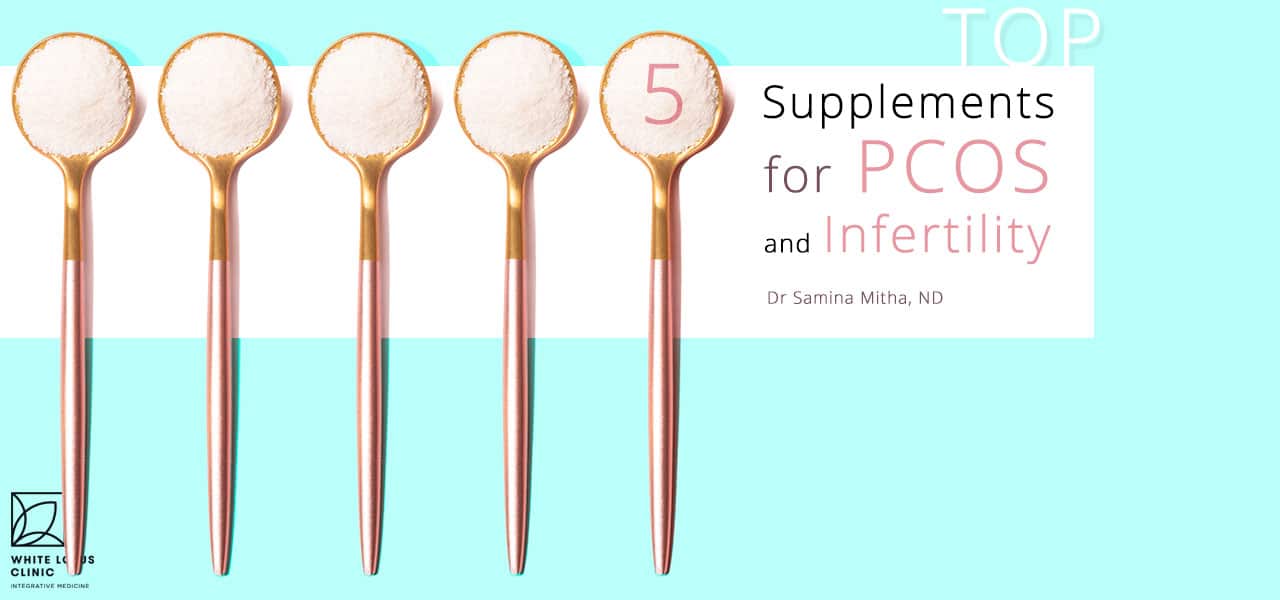Essential Supplements for Fertility with PCOS
Supplements for PCOS have become so vast it can be hard to determine exactly which products are important for you. Ultimately, it still depends on each individual and you should always consult a Naturopathic Doctor before taking any supplementation.
That said, the guide below can help you understand both why these supplements are important for fertility, and the research behind them. Read on to learn about the top 5 supplement options for PCOS and infertility.

1. Myo-Inositol
As far as supplements for PCOS go, Myo-inositol is by far one of the most talked about therapeutic supplements for women with PCOS who are trying to conceive. Myo-inositol can have a big impact in supporting ovarian health. This supplement has many benefits, so this is a short list of its highlights:
- It improves insulin sensitivity, which will ultimately help with restoring ovulation. In fact, some studies suggest that myo-inositol can be just as good as metformin. A study completed in 2010, showed myo-inositol was superior to metformin. [1]
- Several studies report myo-inositol in the fluid of the follicle that houses the egg, and can help to improve egg quality and maturation. This is even more important for women with PCOS. [2]
- It helps to improve the response to LH (luteinizing hormone) and FSH (follicle stimulating hormone) from the brain to the ovary, ultimately supporting ovulation.
- Myo-inositol can help to improve both follicle health, and implantation rates in women going through IVF. [3]
2. NAC
N-acetyl cysteine (NAC) is a very important supplement that has been specifically researched for PCOS and infertility. NAC is derived from the amino acid L-cysteine, and has been historically used to thin mucous during bronchitis and other chest concerns. Below are the benefits of NAC supplements for PCOS and Infertility:
- Powerful antioxidant properties, as it's a precursor to the master antioxidant in the body known as glutathione. Therefore, it is has strong anti-inflammatory effects.
- Improves insulin sensitivity.
- Ameliorates ovulation. When used in conjunction with Letrozole, it improved rates of ovulation and pregnancy rates. [4]
- Reduces serum testosterone levels, which are commonly elevated in PCOS patients.
3. CoQ10
The mitochondria is a body cell that produces energy. In order to produce energy, it requires CoQ10. Ovaries actually have some of the largest concentrations of mitochondria in the body. Additionally, only the mitochondria from the mother is passed down into the embryo. As a result, mitochondrial health is crucial to the formation of healthy embryos. The benefits of CoQ10 include:
- Antioxidant support.
- Improving number of mature follicles, endometrial lining and ovulation rates in women who have PCOS, infertility and are resistant to the previously common drug Clomid. [5]
- Can improve glucose control, blood pressure, elevated cholesterol. [6]
- Can preserve ovarian reserve. [7]
4. Vitamin D
Vitamin D is most commonly known to be the “sunshine” vitamin. In addition, it’s extremely important for women with PCOS who suffer from hormonal imbalances. In fact, vitamin D is actually more similar to a hormone, and influences many biochemical processes in the reproductive system. This system contains vitamin D receptors throughout the ovary, endometrium, and placenta. The effects of correcting a deficiency in this vitamin include :
- Boosting ovulation by supporting follicle development.
- Improving hormone levels such as Luteinizing Hormone, insulin, testosterone, and sex-hormone binding globulin.
- Improving insulin resistance in women with PCOS.
- Raising pregnancy rates in women undergoing IVF [8].
5. Botanicals
Since there are so many botanicals available that can help to support patients who have PCOS and are suffering from infertility, it’s hard to choose just one! Below is a list of a few botanicals and how they can help to support PCOS.
- Black cohosh (Cimicifuga racemosa) can help with ovulation and supporting estrogen levels.
- Licorice (Glycyrrhiza glabra) and white peony (Paeonia lactiflora) together can help with promoting ovulation and reducing testosterone levels.
References:
- Raffone, E., Rizzo, P., & Benedetto, V. (2010). Insulin sensitiser agents alone and in co-treatment with r-FSH for ovulation induction in PCOS women. Gynecological Endocrinology, 26(4), 275–280. https://doi.org/10.3109/09513590903366996
- Akbari Sene, A., Tabatabaie, A., Nikniaz, H., Alizadeh, A., Sheibani, K., Mortezapour Alisaraie, M., … Amjadi, F. (2019). The myo-inositol effect on the oocyte quality and fertilization rate among women with polycystic ovary syndrome undergoing assisted reproductive technology cycles: a randomized clinical trial. Archives of Gynecology and Obstetrics, 299(6), 1701–1707. https://doi.org/10.1007/s00404-019-05111-1
- Simi, G., Genazzani, A. R., Obino, M. E. R., Papini, F., Pinelli, S., Cela, V., & Artini, P. G. (2017). Inositol and In Vitro Fertilization with Embryo Transfer. International Journal of Endocrinology, 2017, 5469409. https://doi.org/10.1155/2017/5469409
- Mostajeran, F., Tehrani, H. G., & Rahbary, B. (2018). N-Acetylcysteine as an Adjuvant to Letrozole for Induction of Ovulation in Infertile Patients with Polycystic Ovary Syndrome. Advanced Biomedical Research, 7, 100. https://doi.org/10.4103/abr.abr_157_17
- El Refaeey, A., Selem, A., & Badawy, A. (2014). Combined coenzyme Q10 and clomiphene citrate for ovulation induction in clomiphene-citrate-resistant polycystic ovary syndrome. Reproductive BioMedicine Online, 29(1), 119–124. https://doi.org/10.1016/j.rbmo.2014.03.011
- Zhang, S., Yang, K., Zeng, L., Wu, X., & Huang, H. (2018). Effectiveness of Coenzyme Q10 Supplementation for Type 2 Diabetes Mellitus: A Systematic Review and Meta-Analysis. International Journal of Endocrinology, 2018, 1–11. https://doi.org/10.1155/2018/6484839
- Kamali, A. (2019). Effects of Coenzyme Q10 Supplementation on Anti-Müllerian Hormone Levels in Patients with Polycystic Ovarian Syndrome. Retrieved from https://www.amhsr.org/articles/effects-of-coenzyme-q10–supplementation-on-antimllerian-hormone-levels-in-patients-with-polycystic-ovarian-syndrome.pdf
- Zhao, J., Huang, X., Xu, B., Yan, Y., Zhang, Q., & Li, Y. (2018). Whether vitamin D was associated with clinical outcome after IVF/ICSI: a systematic review and meta-analysis. Reproductive Biology and Endocrinology, 16(1), 13. https://doi.org/10.1186/s12958-018-0324-3




